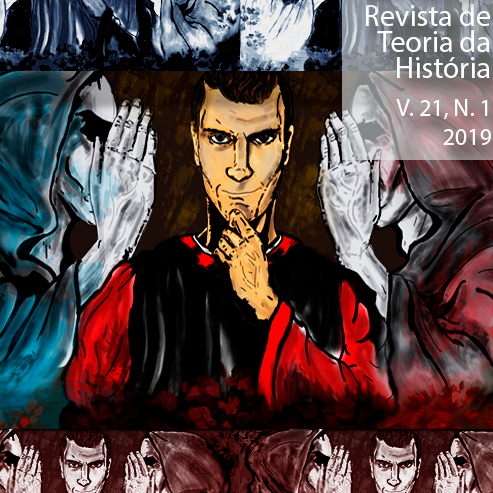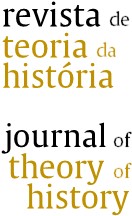O O POVO E A REPÚBLICA: UM ESTUDO SOBRE SALÚSTIO E O CONFLITO POLÍTICO NO REPUBLICANISMO ROMANO
Keywords:
Rome, Republicanism, Democracy, Conflict, History of Political ThoughtAbstract
My goal in this article is to address recent approaches to democracy and popular participation in the field of Political Theory and History of Political Thought. Guided by contemporary theoretical issues, I analyze the writings of a classic republican author, Sallust, with an emphasis on his views regarding political conflict. I intend to demonstrate that Sallust does not hold an essentialist view of political conflict and that his assertions can only be properly assessed if framed within the context of a mixed constitution. I discuss the movement labeled as republican revival, especially its more recent developments concerning the reality of ancient Republican Rome. Next, I consider elements of the debate on the popular element among contemporary political theorists. Finally, I examine Sallust's writings, investigating his thoughts on political conflict and evaluating the relevance of his considerations to the efforts by contemporary theorists to understand the role of the people, and of conflict, in politics.References
ALLEN Jr., Walter. "Sallust's Political Carrer". Studies in Philology. 51(1): 1-14, 1954.
BERLIN, Isaiah. “Two conceps of liberty”. In BERLIN, Isaiah. Four essays on liberty. Oxford: Oxford University Press, 1969.
CICERO. The Republic; The Laws. (Translated by Clinton W. Keyes) Cambridge, London: Harvard University Press, 1928.
EARL, D. C. The Political Thought of Sallust. Cambridge: Cambridge University Press, 1961.
EVRIGENIS, Ionnis D. Fear of Enemies and Collective Action. New York: Cambridge University Press, 2008.
FONTANA, Benedetto. “Sallust and the politics of Machiavelli”. History of Political Thought. 24 (1): 86-108, 2003.
HAMMER, Dean. Roman Political Thought: from Cicero to Augustine. Cambridge: Cambridge University Press, 2014.
KAPUST, Daniel. “Skinner, Pettit e Livy: the conflict of the orders and the ambiguity of republican liberty”.History of Political Thought. 25 (3): 378-401, 2004.
KAPUST, Daniel. Republicanism, Rhetoric and Roman Political Thought: Sallust, Livy, and Tacitus. New York: Cambridge University Press, 2011.
KAPUST, Daniel J.;TURNER, Brandon P. “Democratical Gentlemenand the Lust for Mastery:Status, Ambition, and the Language of Liberty in Hobbes’s Political Thought”.Political Theory.41:648-675, 2013.
KENNEY, E. J., CLAUSEN, W. V. “Sallust”. In: KENNEY, E. J., CLAUSEN, W. V. The Cambridge History of Classical Literature. Cambridge University Press. pp. 268-280, 2013.
KENNEDY, Geof. (2014), "Cicero, Roman Republicanism and the Contested Meaning of Libertas". Political Studies. 62 (3): 488-501, 2014.
LINTOT, Andrew. The Constitution of the Roman Republic. Oxford: Oxford University Press, 1999.
MCCORMICK, John. “Machiavellian Democracy: Controling Elites with Ferocious Populism”. American Political Science Review, 95(2):297-313, 2001.
MCCORMICK, John. Machiavelli against Republicanism: on the Cambridge School’s ‘Guicciardini’ Moments.” Political Theory, 31(5):615-43, 2003.
MCCORMICK, John. Machiavellian Democracy. New York: Cambridge University Press, 20011.
MCCORMICK, John. "Machiavellian Democracy in the Good Society." The Good Society. 21(1): 90-117, 2012.PETIT, Eugène. Tratado Elementar de Direito Romano. (Tradução de Jorge Luís Custódio Porto) Campinas: Russel Editores, 2003.
PETTIT, Philip. Republicanism: A Theory of Freedom and Government. Oxford: Oxford University Press, 1997.
PETTIT, Philip. On the people’s terms: a republican theory and model of democracy. New York: Cambridge University Press, 2012.
PETTIT, Philip. (2013), Two Republican Traditions. in: NIEDERBERGER, Andreas; SCHINK, Philipp. (eds.) Republican Democracy: liberty, law and politics. Edinburgh:Edinburgh University Press, 2013. (169-204).
POCOCK, J. G. A. The Maquiavellian moment -Florentine political thought and the Atlantic republican tradition. Princeton, NJ: Princeton University Press, 2003.
POLYBIUS. The Histories. (Translated by Robin Waterfield) Oxford: Oxford University Press, 2010.SALLUST. The Histories. (Translated by P. McGushin) Vol I. Oxford: Claredon Press, 1992.
SALLUST. “The war with Catiline”. (Translated by J. C. Rolfe) in: Sallust. Cambridge: Harvard University Press, 1931.
SALLUST. “The war with Jugurtha”. (Translated by J. C. Rolfe) in: Sallust. Cambridge: Harvard University Press, 1931.
SKINNER, Quentin. The foundations of modern politica thought. Cambridge; New York: Cambridge University Press, 1978.
SKINNER, Quentin. “The Paradoxes of Political Liberty”. The Tanner Lectures on Human Values. Harvard University, 1984.
SKINNER, Quentin. Liberty before liberalism. Cambridge; New York: Cambridge University Press, 1988.
SKINNER, Quentin. “A third concept of liberty”. Proceedings of the British Academy117, pp. 237-68, 2002.
SYME, Ronald. Sallust. Berkeley: University of California Press, 1964.
URBINATI, Nadia. “Competing for Liberty: the republican critique of democracy”, American Political Science Review, 106(3): 607-621, 2012.
URBINATI, Nadia. “Republicanism: democratic or popular?”, The Good Society, 20(2): 157-169, 2011.
URBINATI, Nadia. Democracy Disfigured -opinion, truth, and the people. Cambridge, Massachutes; London, England: Harvard University Press, 2014.
WALKER, Willian. “Sallust and Skinner on Civil Liberty”, European Journal of Political Theory, 5(3) 237–259, 2006.
WOOD, Neal. “Sallust’s Theorem: A Comment on ‘Fear’ in Western Political Thought.” History of Political Thought. 26(2):174-189, 1995.
Downloads
Published
How to Cite
Issue
Section
License
The journal publishes only and exclusively original manuscripts. All rights reserved.
Licensed under a Creative Commons Attribution-NonCommercial-NoDerivatives 4.0 International License



